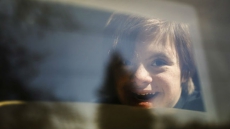HALIFAX — On November 8, 2008, Jean-Michel Blais stood in front of a collapsed primary school in Haiti, watching as 93 bodies, most of them children, stacked up in front of him.
The United Nations police team bore through the rubble in search of survivors, and found a girl trapped between the bodies of two other children. As deputy commissioner of the UN mission, it was Blais who gave the order to cut one of the bodies in half to pull the surviving girl out safely.
More than to serve and protect, Blais says police work is about confronting the problems that people would not, should not and could not deal with.
But sometimes, he can't either.
Blais, who became Halifax Regional Police Chief in 2012, recently revealed he has post-traumatic stress disorder.
It has become a hallmark of his leadership atop the Halifax force, where he has made officers' mental health a priority. By next month, every Halifax cop will complete a half-day Road to Mental Readiness workshop.
"Day in, day out, these officers have to show up at the doors and deal with the challenges that are there," Blais said in a recent talk at Mount Saint Vincent University, "Spat upon. Shot at. Cut. Yelled at … You think that doesn't leave them with a lasting stress?"
Blais wants to start a discussion about mental illness within the force. He says in a "suck-it-up" police culture, officers have been more likely to grab a 40-ouncer than reach for help.
He's trying to change that. "(Officers) have to realize that they have to take care of themselves before they can take care of others," Blais said in an interview.
When he talks publicly about his PTSD, Blais makes a point of wearing his uniform, to show that mental illness can happen to anyone. The symbolism of this is not without its controversy.
"There have been some questions, I think fair questions, about (my) ability to lead," Blais said. "I don't know a good leader who hasn't gone through particular challenges and hasn't come out better for it."
About eight per cent of police officers have PTSD, according to Tema Conter Memorial Trust, which supports first responders. Since 2014, the organization reports that 31 Canadian police officers have committed suicide, including a member of Calgary's service last week.
"Most people experience trauma once in their lives," trust director Vince Savoia said. "Police experience it multiple times a day."
In his 25 years in the Royal Canadian Mounted Police, Blais served three tours in Haiti. In 2008, he became second-in-command of the UN police mission to stabilize the region, leading 1,700 officers of all nationalities.
That fall, four successive tropical storms battered the country, killing 800 people in two weeks.
When he returned to Ottawa in 2009, he found that something was off. He lived in a state of constant discomfort, sleeping fitfully, struggling to find normal.
"I'd look at my son very closely and make sure he was well at all times," Blais said.
In 2010, a catastrophic earthquake devastated Haiti, killing hundreds of thousands of people including 96 UN peacekeepers. Blais was sent to recover the bodies of two fellow RCMP officers, one of them Chief Superintendent Doug Coates, who had taken over his position months before.
A friend asked him if he had had a life changing experience. "I have," he said. "And I need to get out of Ottawa."
He thought it was just work, but things weren't getting any better. He woke four or five times a night, his sheets drenched in sweat. He says his wife learned "nocturnal self-defence" to calm him down when he thrashed in bed.
He accepted a job heading the Halifax RCMP. Not long after, in 2012, he got the top job at Halifax Regional Police, and he sought the medical attention that led to his PTSD diagnosis.
"What was most difficult was going through the actual therapy," he said. "These things bring you back."
As he describes these experiences, Blais focuses on his breathing to slow his heart rate. Talking about PTSD can be therapeutic but also can recall the stress of the traumatic incident.
Sometimes, all it takes is a crack in the sidewalk, and Blais is back in Haiti digging for his friend's dogtags in the debris of the quake-flattened UN headquarters.
There are days he doesn't want to go to work. Then he thinks about the police officers under his command, and he puts on his uniform. It's their problems he's dealing with now.
"They're just police employees for a certain amount of time," Blais said. "We enjoy life through the help and community of others, and when you're injured with a traumatic stress injury, you tend to forget that."


